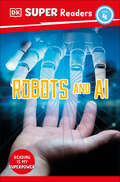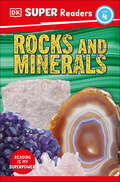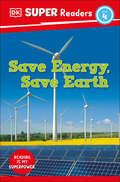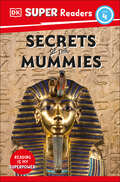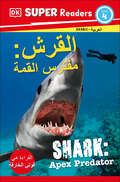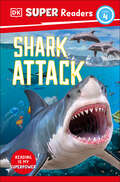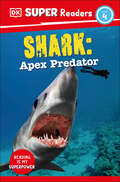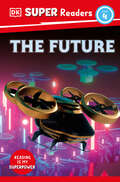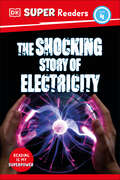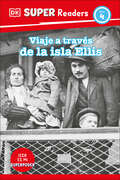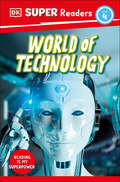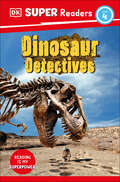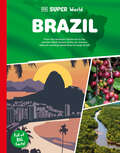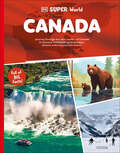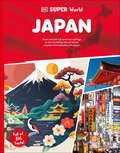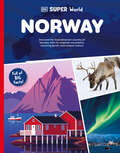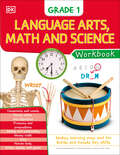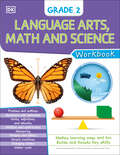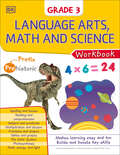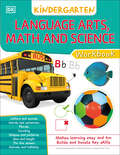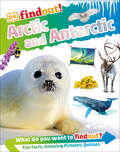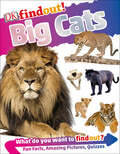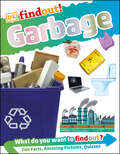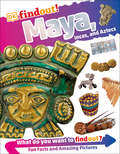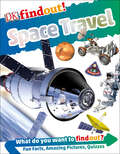- Table View
- List View
DK Super Readers Level 4 Robots and AI (DK Super Readers)
by DKHelp your child power up their reading skills and learn all about robots and artificial intelligence with this fun-filled nonfiction reader carefully leveled to help children progress.DK Super Readers Level 4: Robots and AI will introduce kids to everything they need to know about robots and artificial intelligence—including facts about their first development to what might come next—and is a motivating introduction to using essential nonfiction reading skills, proving ideal for children ready to enter the riveting world of reading. DK Super Readers take children on a journey through the wonderful world of nonfiction: traveling back to the time of dinosaurs, learning more about animals, exploring natural wonders and more, all while developing vital nonfiction reading skills and progressing from first words to reading confidently. The DK Super Readers series can help your child practice reading by:- Covering engaging, motivating, curriculum-aligned topics.Building knowledge while progressing key - Grades 4 and 5 reading skills.Developing subject vocabulary on topics such as artificial intelligence, - science, and technology.Boosting understanding and retention through comprehension quizzes.Each title, which has been leveled using MetaMetrics®: The Lexile Framework for Reading, integrates science, geography, history, and nature topics so there&’s something for all children&’s interests. The books and online content perfectly supplement core literacy programs and are mapped to the Common Core Standards. Children will love powering up their nonfiction reading skills and becoming reading heroes. DK Super Readers Level 4 titles are visually engaging, full of fun facts, and challenge young readers to broaden their subject knowledge while practising nonfiction reading skills. Perfect for children ages 9 to 11 (Grades 4 and 5) who are confident readers ready for a challenge.
DK Super Readers Level 4 Rocks and Minerals (DK Super Readers)
by DKHelp your child power up their reading skills and learn all about Earth&’s geology with this fun-filled nonfiction reader carefully leveled to help children progress.DK Super Readers Level 4: Rocks and Minerals will introduce kids to everything they need to know about Earth&’s rocks and minerals—including fun facts about different rocks and minerals, how they form, and their properties and uses—and is a motivating introduction to using essential nonfiction reading skills, proving ideal for children ready to enter the riveting world of reading. DK Super Readers take children on a journey through the wonderful world of nonfiction: traveling back to the time of dinosaurs, learning more about animals, exploring natural wonders and more, all while developing vital nonfiction reading skills and progressing from first words to reading confidently. The DK Super Readers series can help your child practice reading by:- Covering engaging, motivating, curriculum-aligned topics.- Building knowledge while progressing key Grades 4 and 5 reading skills.- Developing subject vocabulary on topics such as geology, natural resources, and life on Earth.- Boosting understanding and retention through comprehension quizzes.Each title, which has been leveled using MetaMetrics®: The Lexile Framework for Reading, integrates science, geography, history, and nature topics so there&’s something for all children&’s interests. The books and online content perfectly supplement core literacy programs and are mapped to the Common Core Standards. Children will love powering up their nonfiction reading skills and becoming reading heroes. DK Super Readers Level 4 titles are visually engaging, full of fun facts, and challenge young readers to broaden their subject knowledge while practising nonfiction reading skills. Perfect for children ages 9 to 11 (Grades 4 and 5) who are confident readers ready for a challenge.
DK Super Readers Level 4 Save Energy, Save Earth (DK Super Readers)
by DKLearn how to help save our planet. Make reading your superpower with DK&’s beautiful, leveled nonfiction.Use your reading superpowers to learn all about how we could help Earth by saving energy - a high-quality, fun, nonfiction reader - carefully leveled to help children progress. Save Energy, Save Earth is a beautifully designed reader all about where energy comes from and how we can use it more carefully - you will never leave a light on again! The engaging text has been carefully leveled using Lexiles so that children are set up to succeed. A motivating introduction to using essential nonfiction reading skills. Children will love to find out about what energy is and how they can change how they use it to help save Earth.
DK Super Readers Level 4 Secrets of the Mummies (DK Super Readers)
by DKFind out about mummies from all around the world. Make reading your superpower with DK&’s beautiful, leveled nonfiction.Use your reading superpowers to learn all about what mummies are and some famous mummies - a high-quality, fun, nonfiction reader - carefully leveled to help children progress.Secrets of the Mummies is a beautifully designed reader all about mummies - how they were made, where they have been found, and mummy mysteries.The engaging text has been carefully leveled using Lexile so that children are set up to succeed. A motivating introduction to using essential nonfiction reading skills. Children will love to find out about the mysteries of some famous mummies.
DK Super Readers Level 4 Shark Apex Predator (DK Super Readers)
by DKUse your reading superpowers to learn all about sharks and their hunting grounds.Shark: Apex Predator is a beautifully designed, high-quality nonfiction reader all about some of the oceans&’ most fearsome hunters.The engaging text has been carefully translated into Modern Standard Arabic (MSA).A motivating introduction to using essential nonfiction reading skills.Children will love to find out about all kinds of sharks and their prey.
DK Super Readers Level 4 Shark Attack (DK Super Readers)
by DKHelp your child power up their reading skills and learn all about sharks, both feared and fascinating, with this engaging nonfiction reader carefully leveled to help children progress.DK Super Readers Level 4: Shark Attack will introduce kids to everything they need to know about sharks–including how to swim safely with sharks, real-life encounters with sharks, and why we need to keep these predators safe in our oceans–and is a motivating introduction to using essential nonfiction reading skills, proving ideal for children ready to enter the riveting world of reading. DK Super Readers take children on a journey through the wonderful world of nonfiction: traveling back to the time of dinosaurs, learning more about animals, exploring natural wonders and more, all while developing vital nonfiction reading skills and progressing from first words to reading confidently. The DK Super Readers series can help your child practice reading by:- Covering engaging, motivating, curriculum-aligned topics.- Building knowledge while progressing key Grades 4 and 5 reading skills.- Developing subject vocabulary on topics such as sharks, predators, and sea creatures.- Boosting understanding and retention through comprehension quizzes.Each title, which has been leveled using MetaMetrics®: The Lexile Framework for Reading, integrates science, geography, history, and nature topics so there&’s something for all children&’s interests. The books and online content perfectly supplement core literacy programs and are mapped to the Common Core Standards. Children will love powering up their nonfiction reading skills and becoming reading heroes. DK Super Readers Level 4 titles are visually engaging, full of fun facts, and challenge young readers to broaden their subject knowledge while practising nonfiction reading skills. Perfect for children ages 9 to 11 (Grades 4 and 5) who are confident readers ready for a challenge.
DK Super Readers Level 4 Shark: Apex Predator (DK Super Readers)
by DKHunt with sharks, some of the world&’s greatest predators! Make reading your superpower with DK&’s beautiful, leveled nonfiction.Use your reading superpowers to learn all about sharks and their hunting grounds - a high-quality, fun, nonfiction reader - carefully leveled to help children progress.Shark: Apex Predator is a beautifully designed reader all about some of the oceans&’ most fearsome hunters. The engaging text has been carefully leveled using Lexile so that children are set up to succeed. A motivating introduction to using essential nonfiction reading skills. Children will love to find out about all kinds of sharks and their prey.
DK Super Readers Level 4 The Future (DK Super Readers)
by DKHelp your child power up their reading skills and learn all about how we might live in the future with this fun-filled nonfiction reader carefully leveled to help children progress.DK Super Readers Level 4: The Future will introduce kids to everything they need to know about how futurists imagine what lies ahead—including fun facts about space tourism, future food, and farms for algae—and is a motivating introduction to using essential nonfiction reading skills, proving ideal for children ready to enter the riveting world of reading. DK Super Readers take children on a journey through the wonderful world of nonfiction: traveling back to the time of dinosaurs, learning more about animals, exploring natural wonders and more, all while developing vital nonfiction reading skills and progressing from first words to reading confidently. The DK Super Readers series can help your child practice reading by:- Covering engaging, motivating, curriculum-aligned topics.- Building knowledge while progressing key Grades 4 and 5 reading skills.- Developing subject vocabulary on topics such as technology, inventions, and the future.- Boosting understanding and retention through comprehension quizzes.Each title, which has been leveled using MetaMetrics®: The Lexile Framework for Reading, integrates science, geography, history, and nature topics so there&’s something for all children&’s interests. The books and online content perfectly supplement core literacy programs and are mapped to the Common Core Standards. Children will love powering up their nonfiction reading skills and becoming reading heroes. DK Super Readers Level 4 titles are visually engaging, full of fun facts, and challenge young readers to broaden their subject knowledge while practising nonfiction reading skills. Perfect for children ages 9 to 11 (Grades 4 and 5) who are confident readers ready for a challenge.
DK Super Readers Level 4 The Shocking Story of Electricity (DK Super Readers)
by DKHelp your child power up their reading skills and learn all about the science, history, and future of electricity with this fun-filled nonfiction reader carefully leveled to help children progress.DK Super Readers Level 4: The Shocking Story of Electricity will introduce kids to everything they need to know about electricity—including facts about the groundbreaking discoveries of early scientists and future challenges around global warming—and is a motivating introduction to using essential nonfiction reading skills, proving ideal for children ready to enter the riveting world of reading. DK Super Readers take children on a journey through the wonderful world of nonfiction: traveling back to the time of dinosaurs, learning more about animals, exploring natural wonders and more, all while developing vital nonfiction reading skills and progressing from first words to reading confidently. The DK Super Readers series can help your child practice reading by:- Covering engaging, motivating, curriculum-aligned topics.- Building knowledge while progressing key Grades 4 and 5 reading skills.- Developing subject vocabulary on topics such as electricity, science, and technology.- Boosting understanding and retention through comprehension quizzes.Each title, which has been leveled using MetaMetrics®: The Lexile Framework for Reading, integrates science, geography, history, and nature topics so there&’s something for all children&’s interests. The books and online content perfectly supplement core literacy programs and are mapped to the Common Core Standards. Children will love powering up their nonfiction reading skills and becoming reading heroes. DK Super Readers Level 4 titles are visually engaging, full of fun facts, and challenge young readers to broaden their subject knowledge while practising nonfiction reading skills. Perfect for children ages 9 to 11 (Grades 4 and 5) who are confident readers ready for a challenge.
DK Super Readers Level 4 Viaje a través de la isla de Ellis (DK Super Readers)
by DKIdea básicaAprende acerca de la experiencia de los inmigrantes que llegaron a la isla Ellis hace más de cien años. ¡Convierte la lectura en uno de tus superpoderes con nuestros DK Super Readers informativos!- - - - - - - -Help your child power up their reading skills and learn all about Ellis Island and the people arriving there at the turn of the 20th century with this fact-filled nonfiction reader – carefully leveled to help children progress.Explore the history of the world-famous Ellis Island, and the stories of people traveling through one of the most recognized places in the USA.The engaging text has been carefully leveled using Lexile so that children are set up to succeed.A motivating introduction to using essential nonfiction reading skills.Children will love to find out about the history of one of the USA’s most famous landmarks.
DK Super Readers Level 4 World of Technology (DK Super Readers)
by DKTech is everywhere in our lives! Make reading your superpower with DK&’s beautiful, leveled nonfiction.Use your reading superpowers to learn all about technology, from the classroom to space - a high-quality, fun, nonfiction reader - carefully leveled to help children progress. A World of Technology is a beautifully designed reader all about how tech is used in our everyday lives, in work, play, education, home and more! The engaging text has been carefully leveled using Lexiles so that children are set up to succeed. A motivating introduction to using essential nonfiction reading skills. Children will love to find out about the technologies we use in our lives.
DK Super Readers Level 4: Dinosaur Detectives (DK Super Readers)
by DKHelp your child power up their reading skills and learn all about the people who have dedicated their lives to finding out about dinosaurs with this fun-filled nonfiction reader carefully leveled to help children progress.DK Super Readers Level 4: Dinosaur Detectives will introduce kids to everything they need to know about investigating dinosaurs–including who unlocked the secrets of fossils, how dinosaurs became extinct, and the modern-day scientific equipment used in the quest to understand these incredible animals–and is a motivating introduction to using essential nonfiction reading skills, proving ideal for children ready to enter the riveting world of reading. DK Super Readers take children on a journey through the wonderful world of nonfiction: traveling back to the time of dinosaurs, learning more about animals, exploring natural wonders and more, all while developing vital nonfiction reading skills and progressing from first words to reading confidently. The DK Super Readers series can help your child practice reading by:- Covering engaging, motivating, curriculum-aligned topics.- Building knowledge while progressing key Grades 4 and 5 reading skills.- Developing subject vocabulary on topics such as dinosaurs, fossils, and science.- Boosting understanding and retention through comprehension quizzes.Each title, which has been leveled using MetaMetrics®: The Lexile Framework for Reading, integrates science, geography, history, and nature topics so there&’s something for all children&’s interests. The books and online content perfectly supplement core literacy programs and are mapped to the Common Core Standards. Children will love powering up their nonfiction reading skills and becoming reading heroes. DK Super Readers Level 4 titles are visually engaging, full of fun facts, and challenge young readers to broaden their subject knowledge while practising nonfiction reading skills. Perfect for children ages 9 to 11 (Grades 4 and 5) who are confident readers ready for a challenge.
DK Super World: Brazil (DK Super World)
by DKFrom the Amazon rainforest to the samba-filled streets of Rio de Janeiro, take an exciting adventure through Brazil.DK Super World: Brazil is part of the new DK Super World series for children aged 7-11 to explore the wonders of diverse cultures and landscapes across the globe.Captivating and curriculum-aligned, this book builds background knowledge and is the perfect support for learning about the countries of the world. Embark on an educational journey with this enriching Brazil country profile book, specifically tailored for elementary school pupils.This geography book for children offers:Curriculum-aligned and age-appropriate material that covers all the core teaching points.Bright images, engaging content, and interactive elements that helps encourage reluctant learners.Vocabulary-building content covering a variety of topics.Captivating and curriculum-aligned content, diagrams, and interactive elements provide an immersive learning experience while covering core information about the richness of our world, one country at a time.With vibrant visuals and age-appropriate content to make complex information accessible and engaging for young learners, Brazil is the ideal companion to any science learning. Transform learning into an adventure with DK Super World, bringing science to life on every page.
DK Super World: Canada (DK Super World)
by DKJourney through the vast country of Canada to discover breathtaking landscapes, diverse cultures and rich history.DK Super World: Canada is part of the new DK Super World series for children aged 7-11 to explore the wonders of diverse cultures and landscapes across the globe.Captivating and curriculum-aligned, this book builds background knowledge and is the perfect support for learning about the countries of the world. Embark on an educational journey with this enriching Canada country profile book, specifically tailored for elementary school pupils.This geography book for children offers:Curriculum-aligned and age-appropriate material that covers all the core teaching points.Bright images, engaging content, and interactive elements that helps encourage reluctant learners.Vocabulary-building content covering a variety of topics.Captivating and curriculum-aligned content, diagrams, and interactive elements provide an immersive learning experience while covering core information about the richness of our world, one country at a time.With vibrant visuals and age-appropriate content to make complex information accessible and engaging for young learners, Canada is the ideal companion to any science learning. Transform learning into an adventure with DK Super World, bringing science to life on every page.
DK Super World: Japan (DK Super World)
by DKFrom Mount Fuji and hot springs to the bustling city of Tokyo, explore the wonders of Japan.DK Super World: Japan is part of the new DK Super World series for children aged 7-11 to explore the wonders of diverse cultures and landscapes across the globe.Captivating and curriculum-aligned, this book builds background knowledge and is the perfect support for learning about the countries of the world. Embark on an educational journey with this enriching Japan country profile book, specifically tailored for elementary school pupils.This geography book for children offers:Curriculum-aligned and age-appropriate material that covers all the core teaching points.Bright images, engaging content, and interactive elements that helps encourage reluctant learners.Vocabulary-building content covering a wide range of topics.Captivating and curriculum-aligned content, diagrams, and interactive elements provide an immersive learning experience while covering core information about the richness of our world, one country at a time.With vibrant visuals and age-appropriate content to make complex information accessible and engaging for young learners, Japan is the ideal companion to any science learning. Transform learning into an adventure with DK Super World, bringing science to life on every page.
DK Super World: Norway (DK Super World)
by DKDiscover the Scandinavian country of Norway, with its majestic mountains, stunning fjords, and unique culture.DK Super World: Norway is part of the new DK Super World series for children aged 7-11 to explore the wonders of diverse cultures and landscapes across the globe.Captivating and curriculum-aligned, this book builds background knowledge and is the perfect support for learning about the countries of the world. Embark on an educational journey with this enriching Norway country profile book, specifically tailored for elementary school pupils.This learn-to-read book for children offers:Curriculum-aligned and age-appropriate material that covers all the core teaching points.Bright images, engaging content, and interactive elements that helps encourage reluctant learners.Vocabulary-building content covering a wide range of topics.Captivating and curriculum-aligned content, diagrams, and interactive elements provide an immersive learning experience while covering core information about the richness of our world, one country at a time.With vibrant visuals and age-appropriate content to make complex information accessible and engaging for young learners, Norway is the ideal companion to any science learning. Transform learning into an adventure with DK Super World, bringing science to life on every page.
DK Workbooks: Language Arts Math and Science Grade 1 (DK Workbooks)
by DKBoost your child's skills with fun activities and exercises that introduce key concepts in spelling, math, and science.Whether you want to teach your child at home, give them extra support outside the classroom, or find fun stimulation for your budding genius, this workbook has something for everyone. Home learning can be fun with these exercises, featuring drawing, puzzles, kitchen-science experiments, and more. This write-in book provides an introduction to key skills in literacy, numeracy, and science. To help the parent/carer, there are answer pages and notes providing further guidance; and there's no need to buy any specialist equipment or craft supplies - just pick up a pencil!With 60 activity pages to keep your child entertained as well as educated and a reward certificate on completion, there's something in a DK workbook for every child to learn and enjoy.
DK Workbooks: Language Arts Math and Science Grade 2 (DK Workbooks)
by DKBoost your child's skills with fun activities and exercises that introduce key concepts in spelling, math, and science.Whether you want to teach your child at home, give them extra support outside the classroom, or find fun stimulation for your budding genius, this workbook has something for everyone. Home learning can be fun with these exercises, featuring drawing, puzzles, kitchen-science experiments, and more. This write-in book provides an introduction to key concepts and skills in literacy, numeracy, and science. To help the parent/carer, there are answer pages and notes providing further guidance; and there's no need to buy any specialist equipment or craft supplies - just pick up a pencil!With 60 activity pages to keep your child entertained as well as educated and a reward certificate on completion, there's something in a DK workbook for every child to learn and enjoy.
DK Workbooks: Language Arts Math and Science Grade 3 (DK Workbooks)
by DKBoost your child's skills with fun activities and exercises that introduce key concepts in spelling, math, and science.Whether you want to teach your child at home, give them extra support outside the classroom, or find fun stimulation for your budding genius, this workbook has something for everyone. Home learning can be fun with these exercises, featuring drawing, puzzles, kitchen-science experiments, and more. This write-in book provides an introduction to key concepts and skills in literacy, numeracy, and science. To help the parent/carer, there are answer pages and notes providing further guidance; and there's no need to buy any specialist equipment or craft supplies - just pick up a pencil!With 60 activity pages to keep your child entertained as well as educated and a reward certificate on completion, there's something in a DK workbook for every child to learn and enjoy.
DK Workbooks: Language Arts Math and Science Kindergarten (DK Workbooks)
by DKBoost your child's skills with fun activities and exercises that introduce key concepts in spelling, math, and science.Whether you want to teach your child at home, give them extra support outside the classroom, or find fun stimulation for your budding genius, this workbook has something for everyone. Home learning can be fun with these exercises, featuring drawing, puzzles, kitchen-science experiments, and more. This write-in book provides an introduction to key skills in literacy, numeracy, and science. To help the parent/carer, there are answer pages and notes providing further guidance; and there's no need to buy any specialist equipment or craft supplies - just pick up a pencil!With 60 activity pages to keep your child entertained as well as educated and a reward certificate on completion, there's something in a DK workbook for every child to learn and enjoy.
DKFindout! Arctic and Antarctic (DK findout!)
by DKA fact-packed book that explores some of the coldest places on Earth, and the latest title in the award-winning DKfindout! series.Journey to the icy lands at the ends of the Earth and learn all about life at the poles. Explore Earth&’s polar regions—from amazing wildlife to the heroic explorers who ventured there. Discover snowy mountains, frozen seas, and icebergs bigger than skyscrapers! Children will meet the remarkable animals that survive and thrive in the harsh conditions of these icy worlds. There&’s the giant polar bear using its large padded paws to trek many miles across the ice and snow, and the Arctic tern whose incredible flight from one side of the world to the other, is the longest animal migration in the world. Learn all about the spectacular natural light displays that transform the night skies near the North and South Poles, then find out why the Arctic experiences an entire day of darkness at the same time as the Antarctic sees 24 hours of brilliant sunshine. Packed with incredible information, and stunning scenes, DKfindout! Arctic and Antarctic offer a unique look into the fascinating life on, above, and under the ice.
DKfindout! Big Cats (DK findout!)
by DKSupporting STEM-based learning, this fact-filled book for animal lovers ages 6–9 is the ultimate guide to the mightiest members of the cat family, entertaining and educating young readers through a combination of close-up images, quirky trivia facts, quiz questions, and fascinating tidbits on ferocious felines like tigers, lions, and leopards.What&’s the difference between big cats and wild cats? Which big cat is the only one that is unable to roar? What makes cheetahs the fastest animals on land? Find out the answers to these questions and more in DKfindout! Big Cats, which features stunning wildlife photography of these incredible creatures in their native environments. Kids will learn about the physical components of big cats from around the world—including patterned fur coats, retractable claws, and superior senses—and how these components work together to power some of the deadliest predators found anywhere today. From playful hijinks to nighttime prowling, DKfindout! Big Cats captures the world of these awe-inspiring animals in a unique and fun way.Vetted by educational consultants, the DKfindout! series drives kids ages 6–9 to become experts on more than 30 of their favorite STEM- and history-related subjects, whether Vikings, volcanoes, or robots. This series covers the subjects that kids really want to learn about—ones that have a direct impact on the world around them, like climate change, space exploration, and rapidly evolving technology—making learning fun through amazing images, stimulating quizzes, and cutting-edge information. The DKfindout! series is one that kids will want to turn to again and again.
DKfindout! Garbage (DK findout!)
by DKFind out how to live more sustainably, manage waste better, and create an eco-home!Garbage tells us a lot about how humans have lived in the past, how we&’re living now, and the impact our waste disposal has on the environment. To create a more sustainable future, it&’s important that little eco-warriors know about the different types of waste and how to create less garbage! DKfindout! Garbage is a fun, trivia, and activity-filled book that teaches young children between 5 and 9 years old about the problems the planet is experiencing with waste. Published to engaged young activists keen to make a difference, this waste management book: • Covers topics such as &“Electronic waste&”, &“Food we waste the most&”, and &“Recycling ideas for kids&” with a clear visual approach • Includes a glossary to help explain new or tricky terms • Contains flaps at the beginning and end that provide extra core references and a quiz to draw children into the content of the book • Features dynamic, highly visual presented topics including a spread about art made from garbage • Checked by specialist consultants and an educational expert to make sure the information is trustworthy and age-appropriate Teach children how important it is to throw out your trash and recycleThought-provoking and timely, DKfindout! Garbage educates and challenges young readers to ask questions about how garbage is created, disposed of, the biggest contributors to excess waste such as fast fashion, plastic, and electronics - and how they can counter the effects of these culprits. An important yet colorful sustainability book for kids, this title teaches children how to produce less waste and how to manage waste better! They&’ll learn about recycling, upcycling (even creating art from garbage!), how to stop wasting food, and why plastic is a problem. More titles to Findout!This DKfindout! series introduces children to a range of exciting topics in a fun, engaging way. Checked by specialist consultants and an educational expert, this is not only a source of information you can trust but one that is age-appropriate and supports your child&’s schoolwork. Other titles include DKfindout! Science, DKfindout Animals, and DKfindout! Forest.DKfindout! series won Silver in the MadeForMums Awards 2017.
DKfindout! Maya, Incas, and Aztecs (DK findout!)
by DKThis fun, fact-filled book for kids ages 6–9 is the ultimate guide to three great civilizations of the American continents—the Maya, Incas, and Aztecs. Entertaining and educating young readers through a combination of close-up images, quirky trivia facts, quiz questions, and fascinating tidbits, it&’s the perfect book for any kid who can&’t get enough of ancient history.Why was gold sacred to the Incas? Which modern city grew where the Aztec settlement of Tenochtitlan used to sit? How did the Maya and Aztecs first create drinking chocolate? Find out the answers to these questions and more in DKfindout! Maya, Incas, and Aztecs, which features photographs of artifacts, weapons, and personal property from throughout the reign of these awe-inspiring peoples. &“Interviews&” with inhabitants from each civilization give insight into their daily lives, like what they ate and which religions they followed, while sections on medicine, art, and technology show how these cultures&’ achievements have influenced modern society. From Chichen Itza to Machu Picchu, kids will uncover every corner of these amazing civilizations as they flip through the pages of DKfindout! Maya, Incas, and Aztecs.Vetted by educational consultants, the DKfindout! series drives kids ages 6–9 to become experts on more than 30 of their favorite STEM- and history-related subjects, whether Vikings, volcanoes, or robots. This series covers the subjects that kids really want to learn about—ones that have a direct impact on the world around them, like climate change, space exploration, and rapidly evolving technology—making learning fun through amazing images, stimulating quizzes, and cutting-edge information. The DKfindout! series is one that kids will want to turn to again and again.
DKfindout! Space Travel (DK findout!)
by DKSupporting STEM-based learning, this fact-filled book for kids ages 6–9 is the ultimate guide to astronauts, rockets, and the future of space exploration. Entertaining and educating young readers through a combination of close-up images, quirky trivia facts, quiz questions, and fascinating tidbits, it&’s the perfect book for any kid who loves learning about outer space.Who was the first person to reach space? How long did the longest recorded spacewalk last? What is the Arecibo message, and how can it help us contact intelligent extraterrestrial life? Find out the answers to these questions and more in DKfindout! Space Travel, which features photographs of space shuttles, satellites, telescopes, and the experts who operate them. This book guides kids through the technical details of space travel, from the planning and operating of government-led missions to the designing of the first fleet of spacecraft for civilian tourists. Readers will also get an unrivaled look at life in space, learning about the rigorous training and exercise that space explorers must undergo both before and after liftoff.Vetted by educational consultants, the DKfindout! series drives kids ages 6–9 to become experts on more than 30 of their favorite STEM- and history-related subjects, whether Vikings, volcanoes, or robots. This series covers the subjects that kids really want to learn about—ones that have a direct impact on the world around them, like climate change, space exploration, and rapidly evolving technology—making learning fun through amazing images, stimulating quizzes, and cutting-edge information. The DKfindout! series is one that kids will want to turn to again and again.
